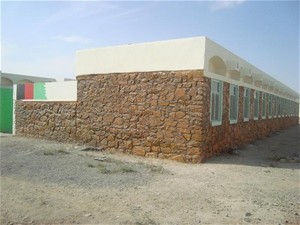
Kandahar residents worked with the international community to refurbish the Aloku School in Dand district, Kandahar province.
USAID/LGCD
Community rehabilitates and protects schools with USAID support.
4 MAY 2010 | DAND DISTRICT, KANDAHAR PROVINCE, AFGHANISTAN
With a student body of more than 250 children drawn from four villages, Aloku School is the largest and most important primary school in Kandahar’s Dand district. However, parents had become increasingly reluctant to send their children to school because of poor security and deteriorating facilities. With a grant from USAID’s Local Governance and Community Development (LGCD) project, these children are now returning to school.
In Kandahar and beyond, community leaders are reclaiming their children’s right to education. Aloku School was missing doors and windows and the roof leaked. The badly damaged boundary wall did little to stop wild dogs from entering the building during classes or drug addicts from using the building at night. The school principal and members of the affected communities requested assistance for building an 80-meter security wall, which they designed with support from the U.S. Marine Corps and a British reconstruction team based in Lashkar Gah. The team also assisted with improvements to the school building, and community leaders paved the road leading up to the school. In addition to benefitting Dand district children, the project provided temporary jobs and income for 45 local men.
Engineers from the Afghan Department of Education and Department of Rural Rehabilitation monitored construction on a regular basis. "The rehabilitation of this school has had a positive impact on the community,” said a representative from the Education Department during a site visit. “Students' interest in learning has increased. More people have shown interest in sending their children to the school."
The Aloku School project is an excellent example of coordination between community leaders, local government, and international partners. The hope is that parents in neighboring districts will draw inspiration from the success of this project and undertake projects to restart education in their own communities.
As USAID’s flagship stabilization effort, LGCD works to engage communities in unstable areas to take an active role in their own security, and addresses priority grievances of at-risk populations through integrated community development projects.







Comment
Make a general inquiry or suggest an improvement.